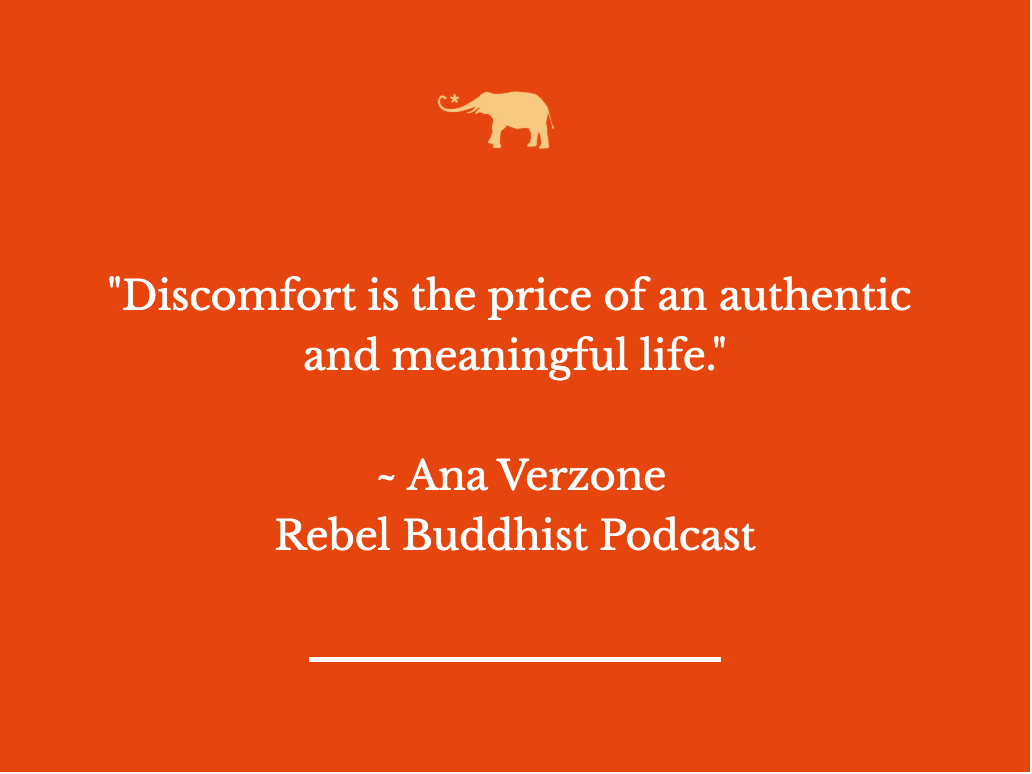View this post on Instagram
This article is created in partnership with Ana Verzone, host of the Rebel Buddhist podcast and spiritual mindset coach for freedom seekers. She is dedicated to giving us the tools we need to live our most adventurous and mindful lives. We’re honored to work with her. ~ ed.
~
“If we learn to open our hearts, anyone, including the people who drive us crazy, can be our teacher.” ~ Pema Chödron
Freedom comes from knowing our inherent worthiness. When we can sit straight, look people in the eye, and show up authentically without fear of their perception of us—this is a type of freedom that can never be taken away.
This acceptance of self doesn’t usually happen overnight, though. It comes from conscious, consistent displays of living with integrity and honesty…and sometimes saying, “no.” If we’ve ever tried doing that even once, we know that means we’re going to piss some people off: our neighbors, our coworkers, our friends, our partners, and, yes, even our beloved families.
We’re trotting right into Tofu-rkey Day, December festivities, and all the pandemonium of trying to make everyone in our lives happy when we make our holiday plans—because when it comes to expectations, is there anything more wrought with them than holiday gatherings?
We all have images in our minds of what the holiday dinner table should look like—who’s sitting at the kids’ table, who’s cooking the brussel sprout casserole recipe that Grandma Mary almost took to her grave, and whose house will contain all the craziness this time.
Last year, our holidays looked slightly different—possibly for the first time ever. Maybe the past traditions took a backseat to the potential of spreading Covid. Maybe we only saw a handful of the CVS-receipt long roster of loved ones that have been fixtures in every annual gathering we’ve ever had. Maybe we cancelled last-minute and really threw our aunts over the edge.
No matter what went down, it’s pretty clear that this year, the lines might be just a tad blurrier, which means it’s time to do the thing that so many of us resent like hell—set some boundaries.
You mean I have to do that again this year?!
Yes—this year, around the holidays, and for literally every other aspect of our lives that truly matter. If we’re feeling burnt out from the state of the world, or want to see our own mom and pop instead of our in-laws at Thanksgiving, or would rather have the clan come to us this year—we’re getting ready to cannonball into a giant pool of everyone’s expectations.
Why is that so f*cking scary to do?
Well, for starters, smack in the middle of expectations and reality is where frustration lives. And if we’re gearing up to place our needs at the center of our holiday plans, we’re going to need to get a lot cozier with our family’s frustrations than we are with our favorite infinity scarves.
Ready to get comfy with some boundary setting?
Sign up for my free Better Boundaries Training here >>
And, guess what? We’re about to embrace the sh*t out of setting some boundaries like a Buddha: by saying no, making requests while standing in our power, being clear, and coming from a place of compassion and love—all without trying to control other people, which is the really sticky part of all of this.
1. Shake the dust off of our personal manuals. We all have one—a rule book that’s ingrained in our hearts and minds, and when someone breaks a “rule” of ours, we kinda want to break up with them.
For example, the whole “to wear or not to wear a mask” adage is going to (unfortunately) still be a thing this year. If our uncles refuse to wear one, we might sense some discomfort brewing within us, which is a “check engine” light shining one of our personal “rules” being broken.
To be a badass boundary-setter, we need to look inward and become aware of what’s in our manuals. Mindfulness. There’s a difference between our own personal expectations and a true boundary.
2. Be able to spot unhealthy boundaries and swap them for healthy ones. Healthy boundaries have consequences that are focused on our actions—not on making someone else behave a certain way. It’s about what we will do if someone violates our physical or emotional space. An unhealthy boundary sounds like an ultimatum, and centers how we want that person to change.
Unhealthy example: “If you keep berating me when we talk, you can’t call me anymore!”
Healthy example: “I know it’s hard to break old patterns, but it’s not respectful to talk to me that way, and it doesn’t feel good. If it happens, I’m going to tell you I’m getting off the phone and hang up. We can talk later and try to speak respectfully to one another.”
In the first example, we’re placing the onus on that family member or friend to make a change, and our statement is based in anger—that’ll never stick. And it feels icky. In the second example, we’re acknowledging that this is something that doesn’t work for us, and what we’re willing to do to protect our emotional/mental boundaries. It’s firm, it’s compassionate, and it’s safe.
Make healthy boundaries a lifestyle.
Sign up for my free Better Boundaries Training here >>
3. Know the difference between boundaries and requests. Boundaries are there to protect our physical and emotional health and space. Requests are the things we’d like other people to do to help us feel better—but we let go of whether or not they do it and take care of ourselves instead.
A boundary is: “If you keep coming over unannounced, I won’t open the door.”
A request is: “Could you please work on not making sexist comments at the dinner table?”
If we end up feeling stressed and burnt out every year because we have a mother-in-law who regularly takes advantage of our tendency to want to people-please, we can practice saying “no” if they passive aggressively assign us the task of making the appetizers and we don’t have the damn energy to tote trays of pigs-in-a-blanket this year.
The only “risk” to firmly placing our boundaries in front of our people is that they might interpret them as “bitchiness” or that we’re “being mean”—and to that, I say, let them think that. Let them be wrong—because our act of staying aligned with our values and expressing it to others is neither bitchy or mean—and it’s not up to us to shape their interpretations of it (more on that later).

4. Enforce the sh*t out of our boundaries. Hard truth: We often create a situation by not enforcing our boundaries, and yet, we blame the other person. We teach people how to treat us, so if we’re not consistent and firm in relaying our boundaries, no one else will be.
If we have a friend who is always extremely late, which is abusing our time, we can say, “hey, I get that you’re not a schedule-follower kind of person. My time is valuable though. If you are more than 15 minutes late in the future, I want to let you know that I won’t wait.” That means after 15 minutes, you leave—or it means if we don’t want to leave after 15 minutes, we don’t set that boundary. It needs to be something we can enforce—otherwise people start acting like toddlers who have parents who don’t ever follow through on consequences.
Boundaries aren’t a “set it and forget it” item. They require repetition and maintenance, even when it’s uncomfortable. The reason discomfort is even present is because of our fear of the negative response someone may have, because their adverse reaction might feel like they “don’t like me,” or “I must not be worthy,” and you know what? We are worthy. We’re damn unicorns. And their response is their stuff, not ours.
Identify what’s yours, and what isn’t.
Join my free Better Boundaries Training, here >>
5. Let people be wrong about you. This is probably the most important thing. It’s a waste of energy to internalize a negative reaction someone has to us setting boundaries, like putting our foot down about not hosting Thanksgiving this year. It’s easier said than done, because the fear we have about people not loving the boundaries we set (take it from a former “Yes Girl”) comes from a deeper feeling of unworthiness.
We want to be liked. We want to be loved. We want the people who like and love us to respect our words and actions—but what we need to remember in these moments is that we are 100% worthy and lovable just the way we are.
Enforcing a boundary that protects our physical space or mental health is coming from a place of self-love. If someone doesn’t like it—and it’s highly likely that someone won’t—that’s okay. I know. It sounds crazy, but it really is okay. We can let them be wrong about us and who we are.
This is essential if we are going to learn to take care of ourselves, and also in helping us be compassionate and loving with those around us. If we are constantly trying to people-please, so that no one ever thinks anything bad about us, we will eventually collapse, because that sh*t is exhausting. And impossible.
When we’ve become aligned with our needs, set healthy boundaries, actively enforced them, and people are STILL pissed off? We need to let that sh*t go. Our happiness can’t hinge on their emotional reactions. Their anger is a sign let them be wrong about us, which is our greatest tool of all.
Overriding our needs to please others comes from the motivational triad: avoid pain, seek pleasure, and do what’s easy. Boundaries require so much work because they take the opposite route—they confront pain, evade momentary pleasure, and prompt us to do all the hard things that are necessary to honor our needs.

When we care too much about what someone thinks about us, even someone we feel is close to us in our lives and hearts, it’s a no-win situation. We’re failing before we’ve even started because we’ve put our power into something outside of us: the other person.
The point of our precious life is not to make people feel comfortable, or happy for us, or proud of us, or feeling good about themselves. If we aim for that, then we’ll be up sh*t’s creek without a paddle, because well, remember? Even if we do everything “right,” we can’t control what people think about us. Ever.
Drop the people-pleasing and pick up a stronger sense of self-worth.
Sign up for my free Better Boundaries Training, today >>
We have to accept that people might think we’re crazy for still having anxiety about Covid, or irresponsible for getting together with a big group, or too conservative for wearing a giant sweatshirt, or too sexy for wearing a sweater dress, or disrespectful for spending all of Thanksgiving in the kitchen cooking, or a bitch for saying we don’t want to cook at all.
And remember, just because someone thinks we’re being a bitch doesn’t mean we are being a bitch. We can enforce boundaries and make requests from a place of compassion and love. We can’t control how other people interpret it.
Veering off the traditional path to show up for ourselves this year is going to plant seeds of anxiety in our friends and families because it incites a spiral within themselves about whether or not they’re listening to their own little voices telling them to “go,” or “stay,” or “rest,” or “engage.”
If they have a negative response to our boundaries, it’s because of how it makes them feel. It really has nothing to do with us—and that’s the goal—to just do what makes us feel whole. Contrary to popular belief, the objective of life isn’t to be happy (yes, even during the holidays). It’s to live honestly, authentically, and to align our outer worlds with our inner ones, because that’s where peace happens.
So, are you ready? Get your stockings in a row, and instead of caring about fulfilling everyone’s expectations this holiday season, care about whether or not you’re living your life fully and authentically, because you’ve got just one.
Boundaries aren’t the whole picture—get more straight-up, rebellious nuggets of wisdom from my podcast: Rebel Buddhist.
 Share on bsky
Share on bsky

Read 15 comments and reply